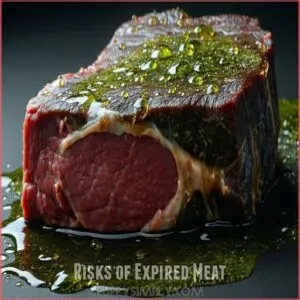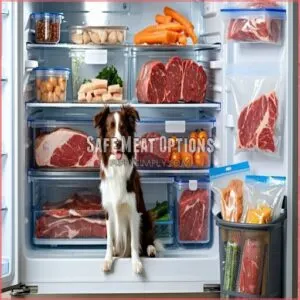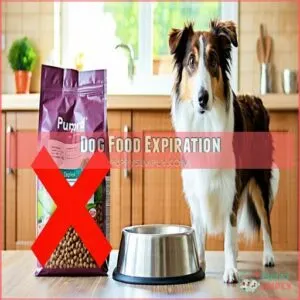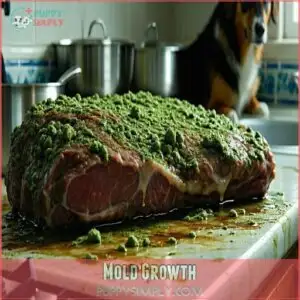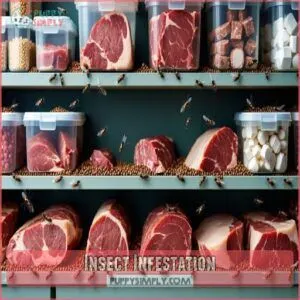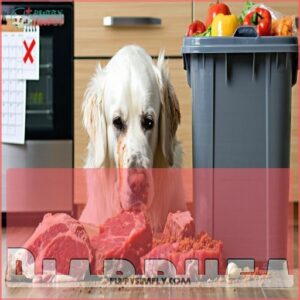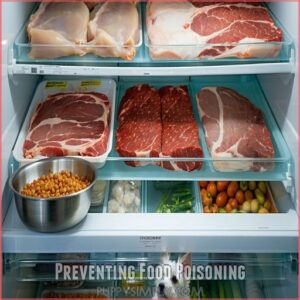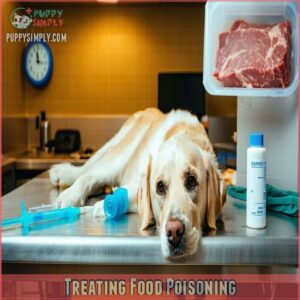This site is supported by our readers. We may earn a commission, at no cost to you, if you purchase through links.

While dogs have hardy digestive systems, they’re not invincible to the nasty effects of spoiled meat, which can lead to vomiting, diarrhea, and even serious complications.
If you’re tempted to save a few bucks, remember that the vet bill for food poisoning will cost way more than fresh meat. There’s a world of safe, protein-rich options that’ll keep your pup’s tail wagging.
Table Of Contents
- Key Takeaways
- Risks of Expired Meat
- Can Dogs Eat Expired Meat
- Safe Meat Options
- Dog Food Expiration
- Spoilage and Health Risks
- Symptoms of Food Poisoning
- Preventing Food Poisoning
- Dangers of Expired Meat
- Treating Food Poisoning
- Healthy Alternatives
- Frequently Asked Questions (FAQs)
- Can dogs eat expired meat?
- What meat should I never feed my dog if they have dementia?
- Can a dog eat past its expiration date?
- What happens if a dog eats expired dog food?
- Can expired meat cause seizures in dogs?
- Can dogs eat meat past use by date?
- Can dogs get sick from eating old meat?
- Can animals eat expired meat?
- Can dogs eat raw meat that has gone bad?
- What are the signs and symptoms of food poisoning in dogs?
- Conclusion
Key Takeaways
- Don’t let your dog eat expired meat; it risks severe food poisoning caused by harmful bacteria like Salmonella and E. coli.
- Watch for symptoms like vomiting, diarrhea, and lethargy if your dog consumes spoiled meat, and call your vet immediately.
- Stick to fresh, properly stored protein options like chicken or turkey to ensure your dog’s safety and nutrition.
- Always check expiration dates on both pet food and meat to avoid health risks and costly vet bills.
Risks of Expired Meat
You’ll want to think twice before letting your dog eat that forgotten steak from the back of your fridge, as expired meat can harbor dangerous bacteria that cause severe food poisoning in pets.
While your dog’s stomach is tougher than yours, it’s still vulnerable to the harmful effects of spoiled meat, which can lead to serious health issues like gastroenteritis.
Food Poisoning
Your furry friend’s stomach isn’t bulletproof against food poisoning from expired meat. While dogs have robust digestive systems, contaminated meat risks are serious business.
Understanding food safety is essential to prevent harm. When your pup consumes spoiled food, they’re vulnerable to foodborne illness that can lead to severe complications.
Watch for telltale signs like lethargy, vomiting, and diarrhea. If you spot these poisoning signs, don’t wait – get veterinary help immediately.
Bacteria Growth
When food poisoning strikes your pup, bacteria are often the culprits behind the scenes. Meat spoilage happens faster than you’d think, with bacterial infection spreading like wildfire, especially in expired meat.
Common troublemakers include:
- Salmonella turns your dog’s tummy into a battleground within hours
- E. coli multiplies rapidly at room temperature, making meat contamination a real threat
- Clostridium botulinum creates toxic reactions even in low-oxygen environments
To minimize the risk of infection, it’s important to understand the causes of meat spoilage and take preventive measures. Understanding microbe control helps keep your furry friend safe.
Gastroenteritis
Gastroenteritis strikes like a storm in your dog’s digestive system after eating spoiled meat. This gut inflammation causes severe vomiting and diarrhea, signaling your canine’s digestive health is under attack from harmful bacteria.
You’ll notice your pup’s discomfort through lethargy, loss of appetite, and frequent bathroom trips. Recognizing symptoms early leads to faster treatment options, so don’t wait – contact your vet immediately for proper care.
Can Dogs Eat Expired Meat
While your dog might beg for that slightly-off steak in your fridge, letting them eat expired meat isn’t worth the risk. Just like humans, dogs can get serious food poisoning from spoiled food, even though their digestive systems are different from ours.
You might think their wild ancestors ate old meat, but modern dogs have evolved alongside humans and become more sensitive to food safety issues. Understanding meat expiration guidelines is essential to prevent harm.
Even meat that’s just a day past its expiration date can harbor harmful bacteria that could make your furry friend seriously ill. If you’re unsure about meat safety, it’s better to err on the side of caution and toss it out. Your dog’s health isn’t worth the gamble – stick to fresh meat or properly stored dog food instead.
Safe Meat Options
You’ll be glad to know there are plenty of safe meat options that won’t put your furry friend’s health at risk.
Fresh chicken, beef, turkey, and fish can provide excellent protein for your dog when they’re properly stored and prepared within their expiration dates.
Processed Meat
Now that you know the risks of expired meat, let’s explore safer options for your furry friend.
Processed meats like ham and bacon might seem like a treat, but they’re best served in moderation. While these meat products have longer shelf lives thanks to meat preservation techniques and additives, they’re packed with sodium and fat.
It’s vital to understand dog food safety to make certain you’re providing the best for your pet. Check packaging safety dates carefully, and remember: frozen meats and canned goods are your friends for extended storage.
Chicken
Chicken serves as a powerhouse of protein for your furry friend, but meat handling requires careful attention.
When considering poultry safety, fresh chicken wins paws down over expired options.
You’ll want to check for any signs of spoiled chicken – strange smells, sliminess, or mold are red flags.
Even if it’s just passed the meat expiration date, it’s better to skip it than risk fowl diseases.
For more information on food safety, it’s vital to understand the risks associated with feeding dogs expired meat to guarantee their overall health and well-being, and it’s key to comprehend the risks associated with feeding dogs expired meat to safeguard their overall health and well-being.
Beef
Beef’s protein-packed punch makes it a popular choice for your furry friend, but expired beef safety is no joke.
When handling beef, stick to lean cuts that are well within their meat expiration dates.
Raw beef can harbor harmful bacteria, so always cook it thoroughly. Checking food safety guidelines is vital to prevent food poisoning.
For superior beef nutrition, store fresh cuts properly in your fridge and watch for any signs of spoilage to avoid expired meat risks.
Fish
While red meat packs a protein punch, fish offers your pup a lighter, omega-3 rich option that’s easy on their stomach.
When choosing fish for your dog, stick to white varieties like cod or pollock to avoid mercury concerns. You’ll want to cook it thoroughly to kill off any parasites – no raw fish here!
To prevent food poisoning issues, proper handling is key. Remember to pick out those pesky bones, and you’ve got a nutritious meal that’ll have your dog’s tail wagging.
Turkey
Turkey offers excellent nutrition for your dog when properly prepared. Like chicken, it’s a lean protein that’s easy to digest and perfect for dogs with sensitive stomachs. Just remember to remove bones, skin, and excess fat before serving.
It’s also vital to check the dog food expiry dates to make certain your dog’s meals are safe and nutritious.
- Fresh, skinless turkey breast simmering in a pot of homemade broth
- Bite-sized turkey chunks mixed with dog-safe vegetables
- Plain, shredded turkey as a training reward
- Turkey meatballs made without seasonings or additives
- Lean ground turkey mixed into regular kibble
This poultry option provides essential nutrients while being gentle on your pup’s digestive system.
Dog Food Expiration
You’ll want to pay close attention to those dates on your dog’s food packages, as they’re more than just numbers on a label.
While the best-by date isn’t legally required in the US, manufacturers include it to help you guarantee your furry friend gets the most nutritious and safe meals possible.
Best by Dates
Now that you know which meats are safe for your pup, let’s understand those best by dates on their food labels. You’ll notice manufacturers provide expiry guidelines to help maintain ideal shelf life and meat safety.
Here’s a quick breakdown: Understanding the best meats for your dog is vital in making informed decisions about their diet.
| Food Type | Best By Period | Storage Tips |
|---|---|---|
| Raw Meat | 1-2 days | Keep refrigerated |
| Ground Meat | 1-2 days | Store at 40°F or below |
| Cooked Meat | 3-4 days | Seal in airtight container |
These dates aren’t set in stone, but they’re your best guide for dog food expiration. Remember, proper storage is key to extending meat expiry dates.
Use by Dates
Unlike best-by dates, use by dates on your dog’s food aren’t just friendly suggestions – they’re serious warnings about food safety.
When you see "use by" stamped on meat products, it’s telling you there’s a real risk of harmful bacteria after that date.
Don’t take chances with expired meat safety – once food passes its use-by date, it’s better to toss it than risk your pup’s health.
Nutritional Value
Tracking your dog’s nutrient balance becomes vital when considering expired meat consumption. While fresh meat provides essential protein content and macronutrients, expired meat’s nutritional value deteriorates over time.
Your dog’s dietary needs depend on consistent caloric intake from quality sources. Even if expired meat retains some nutrients, the risks of spoilage signs outweigh any potential benefits.
It’s also important to research toxic human foods to guarantee a well-rounded understanding of safe and unsafe dog nutrition. Focus on fresh, safe options for superior dog nutrition.
Spoilage and Health Risks
You’ll want to watch out for the triple threat of bacteria, mold, and insects that can quickly turn your dog’s meat from a tasty treat into a health hazard.
Even if the expired meat looks fine to you, these invisible troublemakers can make your furry friend seriously ill with food poisoning.
Bacterial Growth
While the dates on your dog’s food matter, bacteria growth in expired meat poses serious risks. When meat spoils, it becomes a breeding ground for harmful microbes that can cause severe food poisoning in your furry friend. Understanding dog food poisoning is essential to preventing it, especially when dealing with expired or spoiled food.
Three key factors that speed up bacterial growth in meat:
- Warm temperatures above 40°F
- High moisture levels creating the perfect environment
- Extended exposure to air, which lets microbes thrive and multiply
Don’t risk it—when in doubt, throw it out, to prevent severe food poisoning and ensure your dog’s safety with proper food handling.
Mold Growth
Beyond bacterial concerns, mold growth poses serious risks to your furry friend.
When fungi invade spoiled meat or old dog food, they produce dangerous mycotoxins like Penitrem-A and aflatoxins.
These mycotoxins can trigger seizures, tremors, and liver damage in dogs.
For more information on moldy food poisoning, to gain a better understanding, you need to recognize the risks associated with mycotoxin production.
Watch for visible signs of fungal infections, including fuzzy patches or unusual coloring.
Even if you can’t spot mold, spore control is critical – when in doubt, throw it out.
Insect Infestation
Tiny invaders like beetles and moths can turn your pet’s food storage into their personal buffet. These unwanted guests don’t just nibble—they contaminate more food than they eat, making expired meat even more dangerous for your dog.
Understanding pantry pests is essential for maintaining a clean and safe environment for effective pest management and pet safety.
To prevent such issues, store meat in airtight containers, check regularly for signs of insect infestation, and toss any contaminated food immediately to prevent food poisoning symptoms.
Symptoms of Food Poisoning
If you suspect your furry friend has eaten expired meat, you’ll want to watch closely, as the first signs of food poisoning typically appear within a few hours.
If you notice your dog’s suddenly racing to the backyard more often or making those telltale pre-vomit sounds, it’s time to call your vet.
Diarrhea
When your dog eats spoiled meat, diarrhea is often the first red flag of food poisoning.
Harmful bacteria in expired meat can trigger severe digestive issues, leading to dehydration risks that shouldn’t be ignored.
Dogs can get food poisoning from eating old or spoiled food, which makes it necessary to monitor their diet closely.
Treatment options typically start with stopping all food for 12-24 hours, followed by careful symptom management.
Consider dietary changes like bland foods once the diarrhea subsides, but always consult your vet first.
Vomiting
Spotting your dog vomiting after eating expired meat is a clear red flag for food poisoning.
Besides making a mess, vomiting signals your pup’s body is fighting against harmful bacteria. This isn’t your typical upset tummy.
Repeated vomiting can quickly lead to dangerous dehydration and electrolyte imbalances. Contact your vet immediately if you notice this symptom, especially if it persists.
Stomach Upset
Stomach upset from expired meat hits your dog’s digestion like a storm, causing abdominal discomfort that’s hard to ignore. When spoiled meat disrupts your pup’s system, watch for these key dog symptoms:
- Loss of appetite paired with nausea that lasts more than 24 hours
- Impaired nutrient absorption leading to visible weakness
- Persistent digestion issues beyond just vomiting and diarrhea
If these signs appear, don’t wait – call your vet immediately.
Preventing Food Poisoning
Store your dog’s meat in the refrigerator and check it regularly for any signs of spoilage, just like you’d do with your own food.
If you’re ever unsure about the safety of the meat, it’s better to play it safe and throw it out rather than risk your furry friend getting sick from food poisoning.
Proper Storage
For your dog’s safety, storing meat properly is important. Keep raw meat in airtight containers and place them in cool, dry places to prevent bacterial growth. Remember proper thawing in the fridge to maintain meat safety and avoid cross-contamination.
Here’s a quick guide for meat storage tips: Proper dog food storage is essential to maintaining the quality and safety of your dog’s meals.
| Storage Method | Temperature | Maximum Time |
|---|---|---|
| Refrigeration | 40°F/4°C | 2-3 days |
| Freezing | 0°F/-18°C | 4-6 months |
| Raw meat | Room temp | 2 hours max |
| Cooked meat | 40°F/4°C | 3-4 days |
| Dog food | Room temp | 6 weeks |
Regular Check-ups
Regular wellness exams help catch potential issues before they become serious problems. Your vet can provide essential nutritional guidance about what dogs can safely eat, including expired meat risks.
Here’s what regular check-ups typically include:
- Health monitoring through thorough physical examinations to spot early warning signs
- Blood work to detect underlying conditions that might affect food tolerance
- Weight tracking and dietary recommendations for ideal nutrition
Veterinary Care
While watching for signs of canine food poisoning, you’ll want to have a trusted vet clinic on speed dial.
If your dog’s eaten expired meat, don’t wait – contact animal hospitals right away.
Many pet insurance plans cover emergency services and medical tests related to food poisoning.
Quick action could save your pup from serious dog health risks, especially if they show symptoms like severe vomiting or diarrhea.
Dangers of Expired Meat
You’re putting your furry friend at risk when you feed them expired meat, as it can contain dangerous bacteria like Salmonella and Clostridium botulinum.
Even though your dog’s stomach is tougher than yours, they’re not immune to the serious health problems that spoiled meat can cause.
Harmful Microorganisms
Now that you’ve taken steps to protect your pup, let’s look at what’s actually lurking in that old meat. Expired meat harbors dangerous microorganism types like Salmonella, E. coli, and other harmful bacteria.
These invisible troublemakers multiply fast, leading to bacterial contamination that can make your dog seriously ill.
To check for signs of spoilage, you can review the ground beef safety guidelines.
Mold exposure adds another layer of risk, producing toxins that could harm your furry friend’s health.
Clostridium Botulinum
Clostridium botulinum, the silent killer lurking in expired meat, produces toxins that can be lethal even in tiny amounts. These bacteria thrive in low-oxygen environments, making spoiled meat a perfect breeding ground. The bacteria’s ability to form spore forming cells allows them to survive in extreme conditions.
When your dog eats contaminated food, botulism symptoms like weakness, blurred vision, and difficulty swallowing can appear within 4-36 hours. Quick treatment with antitoxin is essential for survival.
Salmonella
Salmonella, lurking in expired meat, poses serious risks to your dog’s health. Symptoms include bloody diarrhea, loss of appetite, and decreased activity levels. Potential pneumonia is another concern.
While dogs can carry Salmonella without showing symptoms, they can still spread it to humans through feces or saliva.
Prevention is key: Stick to well-cooked meats and avoid raw food diets. For more information on salmonella infection, understanding the risks associated with raw food diets is key.
Treating Food Poisoning
If you’ve noticed your dog acting sick after eating expired meat, you’ll need to contact your vet right away for proper treatment and medication.
Your quick action can make the difference between a minor upset stomach and a serious medical emergency that requires immediate care.
Veterinary Attention
If your dog has eaten expired meat, immediately rush them to the emergency vet; every minute counts. Qualified vets can assess the situation and determine proper treatment. While vet consultation costs might worry you, delaying care could lead to severe complications.
- Schedule preventative checkups to catch potential issues early
- Ask about toxicology testing if needed
- Keep your veterinarian’s after-hours contact handy
- Document symptoms for accurate diagnosis
Post-treatment care monitoring at home is essential for recovery.
Medication
Understanding proper medication storage and administration is key to your pet’s recovery from food poisoning. After visiting the vet, you’ll need to follow specific dosage guidelines for your dog’s medication. It’s also important to check the dog food expiry to prevent further complications.
| Medication Type | Common Side Effects | Storage Tips |
|---|---|---|
| Antibiotics | Mild stomach upset | Room temperature |
| Anti-nausea | Drowsiness | Keep sealed |
| Probiotics | None reported | Refrigerate |
Watch for drug interactions if your pet’s on other medications. Your vet may recommend toxicology tests to check for complications during treatment.
Recovery
Your dog’s recovery from food poisoning needs close monitoring and supportive care. Start with fluid replacement to combat dehydration from diarrhea and vomiting.
Once the symptoms ease, introduce a post-illness diet of bland, easily digestible foods. For dogs with persistent vomiting, consider using dog food options that are highly digestible.
Keep an eye on their behavior – if they’re not bouncing back to their usual self after 24 hours of veterinary care, don’t hesitate to call your vet for additional health checks.
Healthy Alternatives
Instead of risking your dog’s health with spoiled meat, you can choose from fresh, properly cooked options like chicken, turkey, or fish that provide essential nutrients without the dangers.
You’ll be glad to know there are plenty of safe alternatives to expired meat that’ll keep your furry friend healthy and happy.
Fresh Meat
Sourcing fresh meat for your pup, like locally sourced beef and chicken, offers incredible nutritional benefits, but safe handling practices are crucial.
Remember, healthy meat options start with smart shopping. Consider fresh meat options that align with your dog’s nutritional needs.
To prevent bacteria growth, always handle raw products separately. Store meat properly at 40°F or below, and check for meat spoilage signs like odd colors or smells.
Cooked Meat
Safety after cooking meat for your pup depends heavily on proper storage. To prevent bacteria growth, store cooked meat in airtight containers and refrigerate within two hours.
Watch for spoilage signs like off-putting smells or discoloration before reheating. Understanding bacteria risks is essential to prevent food poisoning in dogs.
While nutritional changes occur during cooking, it’s still safer than serving expired or spoiled meat that could cause food poisoning in your furry friend.
Balanced Diet
Your dog’s balanced diet should primarily come from quality commercial dog food to ensure they receive all essential nutrients without the risks associated with homemade meals. While fresh food options are tempting, they shouldn’t replace commercially prepared food.
Checking the best by date is essential for peak nutrition.
You can occasionally mix in safe protein sources like lean meats, but don’t make them the main course. If you’re considering dietary supplements, check with your vet first to maintain proper nutritional balance.
Frequently Asked Questions (FAQs)
Can dogs eat expired meat?
Feeding expired meat isn’t worth the risk, like playing Russian roulette with your pup’s health.
Even if it’s just slightly past date, it can cause serious food poisoning.
You’re better off avoiding it.
What meat should I never feed my dog if they have dementia?
For dogs with dementia, avoid feeding raw or high-fat meats like pork.
These can upset their sensitive digestive systems.
You’ll want to stick with lean, cooked proteins like chicken or turkey.
Can a dog eat past its expiration date?
While you might be tempted to feed your dog expired meat, it’s risky.
Even if it’s just a day past the date, bacteria can cause serious food poisoning.
Don’t gamble with your pup’s health.
What happens if a dog eats expired dog food?
Expired dog food can upset your pup’s stomach, causing vomiting and diarrhea.
It’ll lack proper nutrients and might harbor harmful bacteria.
Don’t risk it – always check those expiration dates and store food properly.
Can expired meat cause seizures in dogs?
Your dog’s life could hang by a thread if they eat spoiled meat.
Severe food poisoning can cause electrolyte imbalances, leading to seizures in extreme cases. While seizures aren’t a common direct symptom.
Can dogs eat meat past use by date?
Feeding dogs meat past its use-by date isn’t recommended.
While they might handle slightly expired food better than humans, it’s risky.
The meat could harbor harmful bacteria that cause severe food poisoning.
Can dogs get sick from eating old meat?
Just like humans hitting the gym after a month off, dogs’ bodies can’t handle spoiled meat.
They’ll likely experience severe food poisoning, vomiting, and diarrhea.
Don’t risk it with questionable meat.
Can animals eat expired meat?
No, animals shouldn’t eat expired meat as it can cause severe food poisoning.
Like humans, they’re vulnerable to harmful bacteria in spoiled food.
It’s best to stick with fresh, properly stored meat.
Can dogs eat raw meat that has gone bad?
Raw, spoiled meat poses serious health risks to your dog.
Don’t feed it to them – the bacteria can cause severe food poisoning, leading to vomiting and diarrhea.
Contact your vet immediately if they’ve consumed bad meat.
What are the signs and symptoms of food poisoning in dogs?
Watch for vomiting, diarrhea, lethargy, and loss of appetite in your dog.
Excessive drooling, signs of abdominal pain, or a fever are also important symptoms to monitor.
If you observe any of these signs, call your vet immediately.
Conclusion
Did you know that 68% of pet owners admit to feeding their dogs questionable food?
But regarding expired meat, there’s no room for compromise. Your dog’s health isn’t worth the risk – bacteria in spoiled meat can lead to severe illness and costly vet bills.
Instead of wondering "can dogs eat expired meat," focus on providing fresh, properly stored protein sources. Investing in quality food today means fewer health issues tomorrow. Keep your furry friend safe by sticking to fresh meat options.
- https://www.petmd.com/dog/conditions/digestive/c_dg_salmonellosis
- https://www.mypetchild.com/dogs/health/eat-expired-meat/
- https://smartdogowners.com/can-dogs-eat-expired-meat/
- https://vetexplainspets.com/what-to-do-if-dog-ate-spoiled-food/
- https://pets.stackexchange.com/questions/1553/can-i-feed-a-dog-cooked-meat-or-fish-that-is-a-week-old

